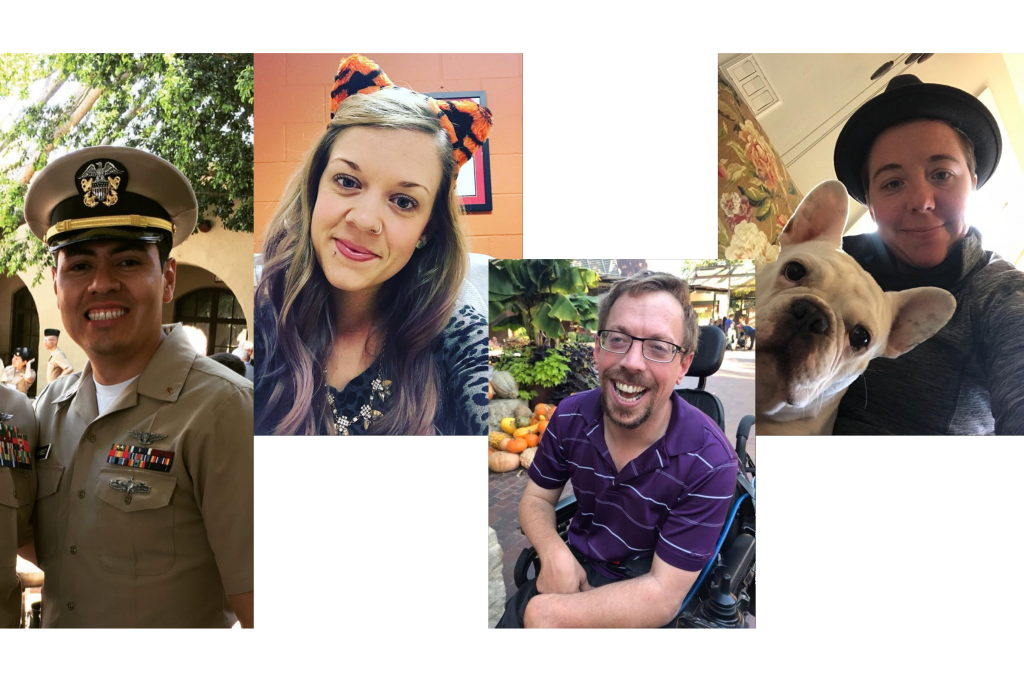A sermon by Rev. Blair Trygstad Stowe and Ray Trygstad
Sunday, June 17, 2018 at First United Methodist Church, Ontario, California and at Wesley United Methodist Church, Naperville, Illinois. Variations in delivery before each congregation are noted in the text.
The scripture reading before the sermon is 1 Samuel 15:34-16:13.
Who?
This must be one of the most commonly asked questions in history. Anytime something needs doing, a job needs filling, a vacuum of power arises, or you need someone, the same question always comes up: Who? Who will do it? Who can we send? Who will run? Who will save us? Who will be my friend?
Who?
The people of Israel said “Who?…Who will be our King?” They didn’t have a king, but all the folks around them did, so they decided they just had to have one too. And the Lord answered their prayers; He told his prophet Samuel to anoint Saul to govern his people. Saul looked the part of a king. He was a tall man, a full head taller than everyone else. By the time of our story today, he was a war hero as well. He seemed to be everything the people thought a king should be. (Based on height alone, he could have been a university president, who as a group are far taller than the general population.) But he was as it turns out, disobedient. And disobedience in Israel’s history seems to be God’s biggest pet peeve. So, the scripture tells us, “…the Lord regretted that he had made Saul king over Israel.”
Now, let’s just take a brief aside here to recognize the danger of the phrase, “the Lord regretted…”. This only happens twice in our scripture. The only other instance is prior to the great flood of Noah when God decides to destroy most of humanity and try creation again. But we have to ask, does saying that God can regret mean the Lord is fallible?
We would like to offer a firm, No.
It means we are. God intended humanity to be good and holy, but they chose to turn against God. God knew what Saul was capable of as a leader, but Saul let Him down.
And now we find ourselves asking: Who? If not Saul, then who?
The Lord sent the prophet Samuel (whom we met two weeks ago) to Bethlehem, to anoint a new king. A small village, certainly not the place one would expect to find a king. He couldn’t even come in the open; after all, he used to be the ruler of the people of Israel. He came to make a sacrifice, as a subterfuge. He didn’t even know who to select, but he knew it was one of the eight sons of Jesse, who seemingly had many kingly virtues. But often God does not work the way we think he will. He doesn’t choose the obvious. He doesn’t choose those we expect.
These four young people on the screen share something in common, other than their age. I wonder if we can guess what it is? What do you think?
{actually take answers} They are all United Methodist Clergy.
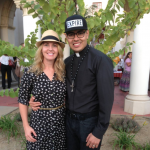 Rev. Francisco Garcia was ordained yesterday as an elder in full connection in the Cal-Pac Annual Conference. He serves as a reserve Navy Chaplain while working full time as an associate pastor in a San Diego Suburb. Francisco is bilingual in Spanish and English and pastors in both languages. He also runs an alternative ministry space called “The Industry Chula Vista” which cultivates community for discipleship by hosting events and community gatherings. It has become a regular tour stop for bands in the punk rock music scene.
Rev. Francisco Garcia was ordained yesterday as an elder in full connection in the Cal-Pac Annual Conference. He serves as a reserve Navy Chaplain while working full time as an associate pastor in a San Diego Suburb. Francisco is bilingual in Spanish and English and pastors in both languages. He also runs an alternative ministry space called “The Industry Chula Vista” which cultivates community for discipleship by hosting events and community gatherings. It has become a regular tour stop for bands in the punk rock music scene.
`
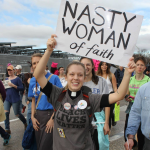 Rev. Brenna Lakeson is a Deacon in the Western North Carolina Annual Conference, and works as the communications and outreach coordinator for the Central Outreach and Advocacy Center, a homeless services center in downtown Atlanta. Brenna is a self proclaimed cat lady, an outspoken advocate for human rights, and blogs beautifully at brennalakeson.com
Rev. Brenna Lakeson is a Deacon in the Western North Carolina Annual Conference, and works as the communications and outreach coordinator for the Central Outreach and Advocacy Center, a homeless services center in downtown Atlanta. Brenna is a self proclaimed cat lady, an outspoken advocate for human rights, and blogs beautifully at brennalakeson.com
`
`
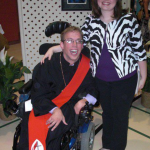 Rev. Justin Hancock is also a Deacon from the North Texas Annual Conference. Justin lives with Cerebral Palsy, but his ministry is not restricted to disability advocacy. Justin lives in Dallas in a Missional Wisdom Foundation New Monastic Community. That’s a lot of words to say; it means he lives in a house with his wife and several other young Christians to try and model the earliest Christian communities. They practice their faith together through hospitality, shared meals, a pattern of worship and prayer, and acts of justice in their neighborhood. Justin previously served as the director of the Texas Tech Wesley Foundation, currently works with African refugees in Dallas, and is one heck of a preacher.
Rev. Justin Hancock is also a Deacon from the North Texas Annual Conference. Justin lives with Cerebral Palsy, but his ministry is not restricted to disability advocacy. Justin lives in Dallas in a Missional Wisdom Foundation New Monastic Community. That’s a lot of words to say; it means he lives in a house with his wife and several other young Christians to try and model the earliest Christian communities. They practice their faith together through hospitality, shared meals, a pattern of worship and prayer, and acts of justice in their neighborhood. Justin previously served as the director of the Texas Tech Wesley Foundation, currently works with African refugees in Dallas, and is one heck of a preacher.
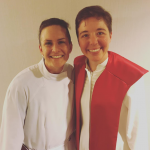 Rev. Britt Cox is an Elder in the Northern Illinois Annual Conference. Her first appointment was to First United Church of Oak Park, a shared congregation of both the United Methodist Church and the United Church of Christ. We lose many of our LGBTQIA+ pastors to the more inclusive UCC denomination, but Britt is committed to her Methodist roots. She has just been appointed to another UMC/UCC shared church and finds a particular home in places where theology and tradition seek to blend in order to create vital and relevant gospel communities. In this photo, she is shown with M Barclay, the first gender non-binary individual ordained in the United Methodist Church.
Rev. Britt Cox is an Elder in the Northern Illinois Annual Conference. Her first appointment was to First United Church of Oak Park, a shared congregation of both the United Methodist Church and the United Church of Christ. We lose many of our LGBTQIA+ pastors to the more inclusive UCC denomination, but Britt is committed to her Methodist roots. She has just been appointed to another UMC/UCC shared church and finds a particular home in places where theology and tradition seek to blend in order to create vital and relevant gospel communities. In this photo, she is shown with M Barclay, the first gender non-binary individual ordained in the United Methodist Church.
These faces are the rising leaders of our church. While they may not look like your typical Methodist circuit riders, they are each filled with a passion for Christ’s life giving love, gifted with skills for leadership, and have been called out, examined, set apart, and anointed to guide the ministry of the church.
But how would you genuinely feel if one of these young people had just been announced as the new pastor of this congregation? Would you trust them to lead our spiritual life together? What assumptions would get in the way?
David was not the right choice in Samuel’s eyes. Despite his many faithful years of service as God’s priest, Samuel assumed God would want the tallest, oldest, and most handsome of Jesse’s sons be serve as Israel’s new king. But no, God is not interested in what is on the outside, how the world sees the next king. God is sick of unfaithfulness. The Lord chooses instead the son with the most faithful heart. And in so doing, God shows us that our character, what is on the inside, is of much greater importance to God than how the world sees us.
Perhaps a more important question about our four clergy persons; If you had been introduced to any of these young people in a setting outside of church, would you have assumed them to be a Christian? Would you have sought to be their friend? Would you feel drawn to ask them their stories with an open heart, ready to receive the fullness of their character, experiences, brokenness, and gifts?
One of the largest challenges to peace, justice, and the flourishing of God’s kingdom is our reluctance to lay aside our assumptions. We categorize to make sense of the world, but when we do so we see with human eyes. Rarely do we entertain the spiritual and emotional effort to set aside our worldly lenses, and see one another through God’s eyes. When Samuel selects Jesse’s oldest son first, the story says, “Do not look on his appearance or on the height of his stature, because I have rejected him for the Lord does not see as mortals see; they look on the outward appearance, but the Lord looks on the heart.”
For our modern era we might read that, “Do not look upon his appearance, or race, their gender, or sexuality, her weight, tattoos and piercings, or his differently abled body. For the lord does not see as mortals see. The Lord looks on the heart.”
So who might we be missing in our churches, because we fail to see one another’s hearts? Who may be already among us that has potential, and maybe even desire for leadership in ministry, but whom we have assumed was not interest, or not capable. Who is not at the table as we plan for the future of our ministry together? Who are our neighbors, beyond what we see as we drive to and from the church? Who is God calling? Who has God anointed?
[Ray: I am preaching today because our clergy are in Aurora, participating in the pride parade.] (Naperville delivery only. Blair may have delivered a variant of this line.) The first pride parade was held in 1970, one year after the Stonewall Riots. The goal of the march, and the gay liberation movement it stemmed from, was to flip the stigma of homosexuality and non-binary gender expressions, into a public celebration of diversity. Due to societal and legal pressures, LGBTQ persons often led double lives to participate in “everyday” life. But how could society come to accept LGBTQ people if they were hidden? Pride events developed to allow people to show their true selves. I would say to share with honesty and authenticity their God-given belovedness. Nearly 50 years later, the LGBTQIA+ community is still fighting stigma. And “good Christian people” are mostly to blame for perpetuating their rejection.
Pride is still necessary because the church fails to see LGBTQIA+ through the eyes of God. The church fails to see their hearts, distracted by the apparent gender of the person they are holding hands with. Our church fails to acknowledge God’s ability to “regret” and change the course of God’s own plan to select new leaders for a new era. Leaders that may not look like, act like, sound like, love like, we think they ought to.
Pride, then, is a holy act of resistance. It dares the world to drop assumptions and see the fullness of individuals as they were made by God to be. It dares us to push back against the stigma placed upon each of us, whatever that shame may be, and share our own authentic selves with our beloved community. Pride dares each one of us to be the children of God together, without reservation, seeing one another’s hearts as God does.
[Blair: I recognize our congregation is not the congregation I grew up in. We are not a reconciling congregation. We are not openly affirming and we together in this sanctuary are of mixed mind about LGBTQIA+ inclusion in the church, and the contextual reading of scriptures that reference human sexuality. But I want us all to know this as we consider our identity as a congregation and how we will move forward into this next chapter of our history; there are already Gay men, Lesbian women, Transgender people, Queer, Intersex, Asexual and even more diversity of sexual orientations, gender identities, and expressions of love, in our midst. And furthermore, they have always been here. LGBTQIA+ identities are not new inventions. We may have more complex names and definitions, but Queer people have been amongst you throughout the history of this church. 10% of the population at any time is expected to be outside the heteronormative identity. These people are, and have always been in our midst. I choose to believe we have already seen them with the eyes of God; accepting them and loving them, and celebrating their gifts. But as long as we remain ambiguous about our stance on LGBTQIA+ inclusion, there will be people who will never risk the walk into our sanctuary for fear of rejection and being forced back into the closet. As our denomination considers our options of unity or disunity in 2019, the Bishops have promised congregations will not be forced to take a vote on whether they will be welcoming of LGBTQIA+ members and clergy. But there is no way we get to the other side of February 2019 and don’t at least have to talk openly about where we will stand. The sooner we begin to have these conversations among ourselves about who we will accept in our pews, on our altar, and in our pulpit, the better off we will be as our denomination faces this massive shift.] (Ontario delivery only)
[Blair: More than anything,] I pray our church and our communities would embrace God’s challenge to see with divine eyes every person in our midst. Because if we continue to keep our spiritual vision shut, we run the danger of missing who God has already called in our midst. Who God may be gathering together to enrich our faith community. Who God may have already anointed to lead us into the next chapter of our life as the Body of Christ. And until we are willing to see, find, love, every single who, the Body of Christ will not be complete.
Let us pray.
